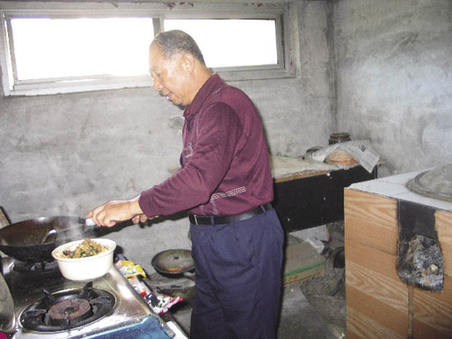| Biomass Energy: An Indispensable Link in the Circular Economy
By staff reporter ZHAO YAYUAN
|
 |
|
No more soot in farmers' kitchens now that they are suing biogas to cook. Zhao Yayuan |
BIOMASS energy is currently the fourth largest energy source in the world, exceeded only by coal, petroleum and natural gas. It can be obtained from plants, animal and human excrement, garbage and organic wastewater. The importance of developing green energy, particularly its development from waste materials, is ever more widely recognized, so in China, projects involving self-contained, consumer-producer energy loops are encouraged.
"China's biomass technology produces biogas, biologically generated electricity (bio-electricity), and liquid and solid biofuel," explained Wang Jun, chief of the New Energy and Renewable Energy Department of the National Energy Bureau. According to him, by 2007 China had 28 million household-based methane ponds in rural areas and 2,200 large-scale operations affiliated with animal farms and industrial projects; together they produced 10 billion cubic meters of biogas using animal and human excrement and industrial wastewater as raw materials. The country's current installed capacity for bio-electricity generated from straw and stalks stands at 3 million kW, with more than 100 such projects under construction; its annual capacity for making ethanol from stale and fermented grain totals 1.4 million tons. At present, however, the development of biomass energy is occuring mainly in rural areas.
A Circular Economy
Last December, villagers in Shuiyu New Village of Beijing's farthermost Yanqing County began to use biogas supplied free of charge by the Beijing Deqingyuan Agricultural Sci-tech Co., Ltd., who operates on its egg farm China's largest methane power plant. Biogas is supplied to nearby villagers as well as used to generate electricity. On April 9, 2009 the Deqingyuan Methane Power Plant was connected to the local power grid and geared to feed it an annual output of 14 million kWh, which translates into a reduction of carbon dioxide emissions of more than 90,000 tons.
The egg farm, named Deqingyuan Eco-Garden, is China's largest egg producer. Built in 2002, it now spreads across a comfortable 53 hectares. Besides the main office building, it has 13 buildings for chicks – each housing 50,000-60,000, and 19 buildings for hens – 100,000-110,000 in each. The farm is equipped with two underground traffic lanes: eggs are sent through the clean channel to the packaging workshops from where they are sent to market; and the sewage channel conveys chicken feces and sewage to the methane power plant.
Mr. Ding, a technician at the methane power plant, told this reporter that chicken feces and sewage reaching the works are put into a homogenization and hydrolysis pond to mix. After filtering out the sand, the mixed liquid passes through a feeder into four anaerobic action tanks that produce methane through fermentation. After a two-step desulfation and one-step dehydration process, the gas is sent into a storage container connected to two GE Jenbacher internal combustion engines. Here the gas is converted into valuable electricity.
Gu Qing, executive vice president, claims that the methane power plant has solved the farm's feces treatment problem. The period between 2002 and 2004 was stage one of Deqingyuan's plan. "At that time, we raised 500,000 hens, producing anywhere from a few to over a dozen tons of feces per day, and it was easy to dispose of," said Gu, referring to the sale of feces to farmers as fertilizer. When Deqingyuan scaled up to 3 million hens, the daily output of 200 tons of feces and sewage became a serious problem. As Gu explains, "Large-scale chicken farms cause serious pollution. Chicken feces produce methane, whose damage to the air is 20 times that of carbon dioxide. On top of that we wash the chicken coops and eggs everyday, which produces large quantities of sewage. Without proper disposal, it seriously damages the local environment."
Deqingyuan looked at various technologies recommended by the state, and finally chose the methane power plant. Gu Qing points out two advantages, "First, through methane power generation, we have realized zero emissions, because all the sewage is captured and recycled. Second, we have entered into a circular economy."
Gu elaborates. Yanqing County is suitable for raising organic corn. The plant has signed a long-term purchasing contract with 60,000 farming households in six surrounding villages. Their corn is purchased to make organic feed, and the hens lay high quality eggs. Chicken waste and sewage are used to produce biogas and then generate electricity. The residue and wastewater discharged by the methane power plant constitutes high-quality organic farming fertilizer, and the circle is closed when farmers deploy that in raising organic vegetables, crops and fruits. "An additional benefit is that the seamless links of the supply chain have raised the quality of local products, and improved soil and land productivity with reduced dependence on chemical fertilizers," says Gu Qing. He went on to comment on community relations, "Through the circular economy, Deqingyuan and local farmers have built a closer and more cooperative relationship."
As part of that cooperation, Deqingyuan provides free methane gas to nearby villages that used to burn coal and firewood for their cooking and heating needs. Villagers of Shuiyu are among the 200 odd households who benefit. Gu Qing sums it up, "This is good for preserving our natural environment, and social benefits come along with it."
|
